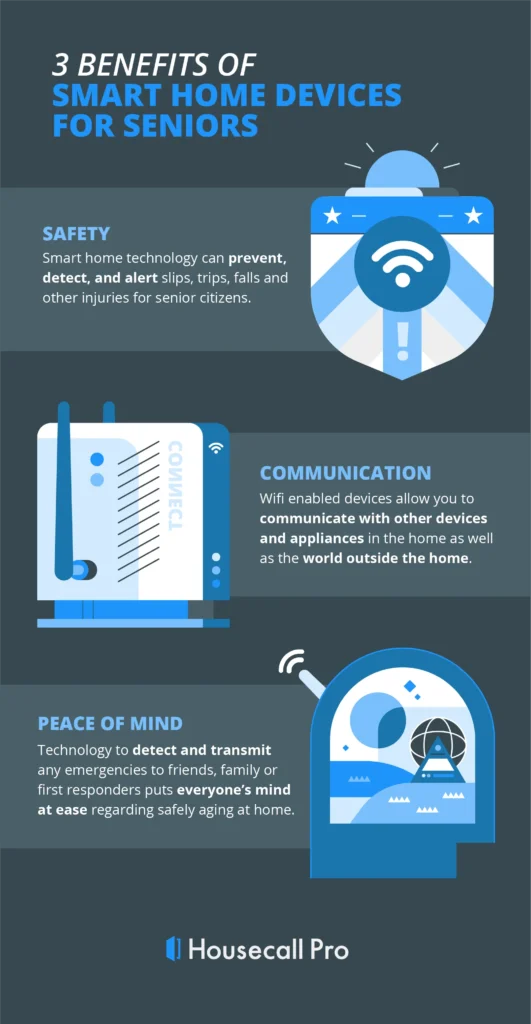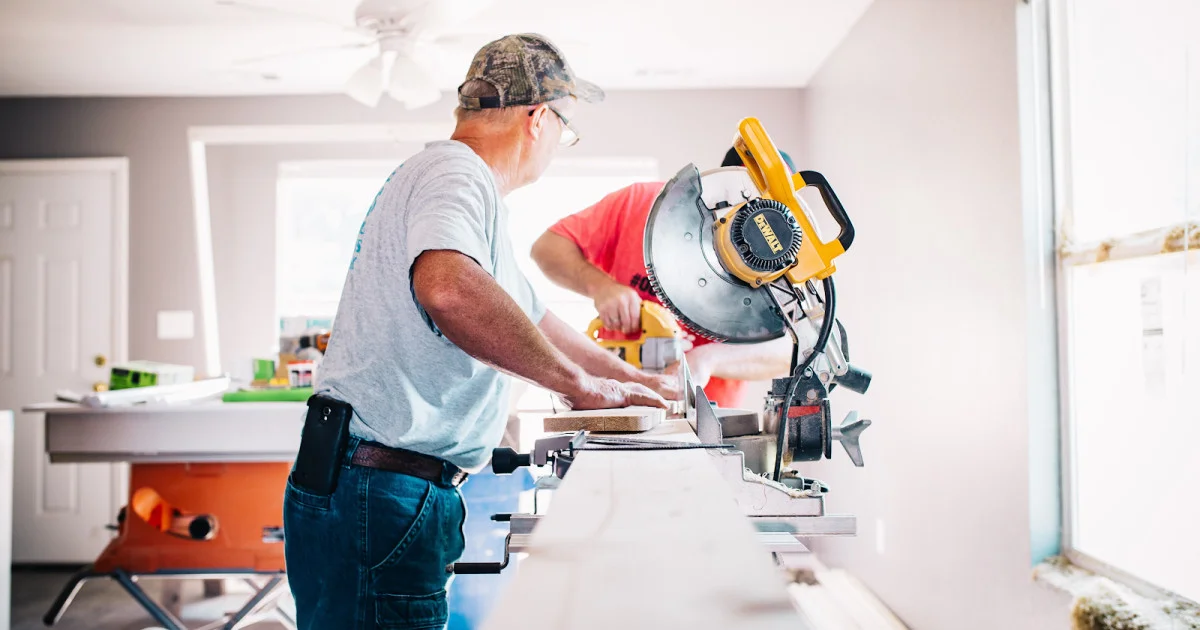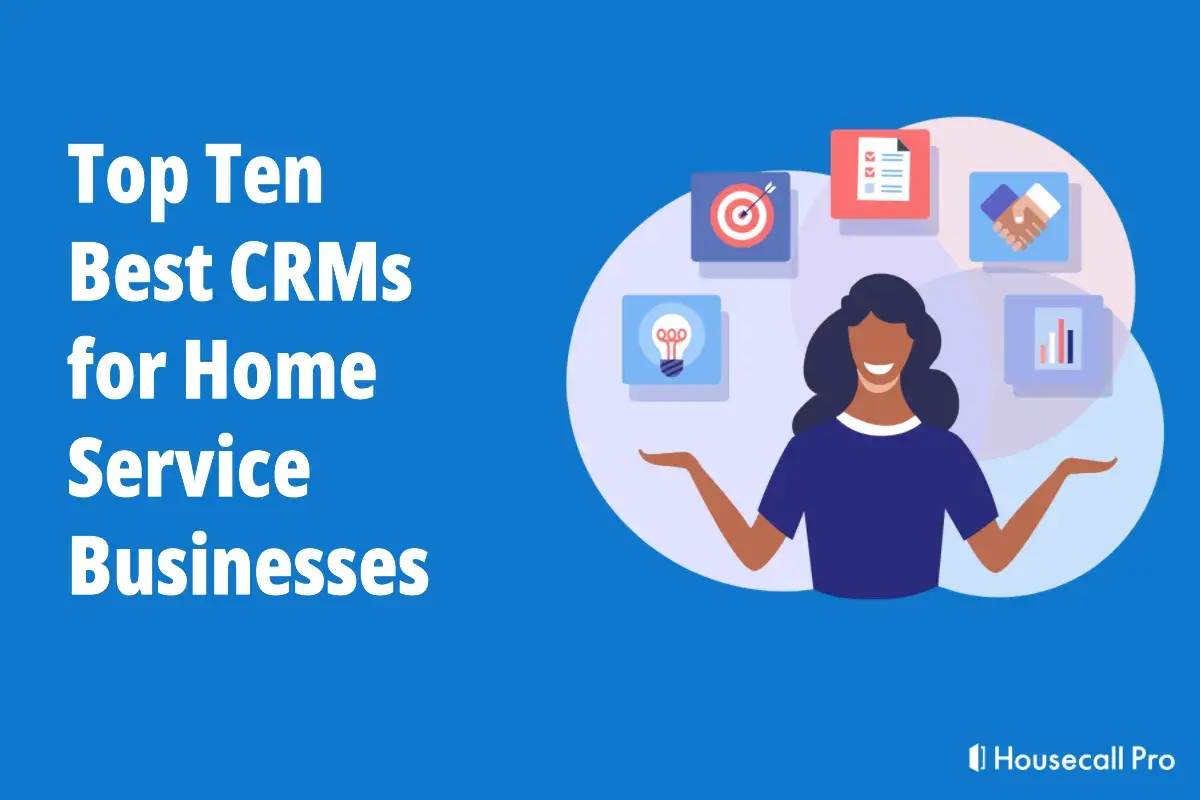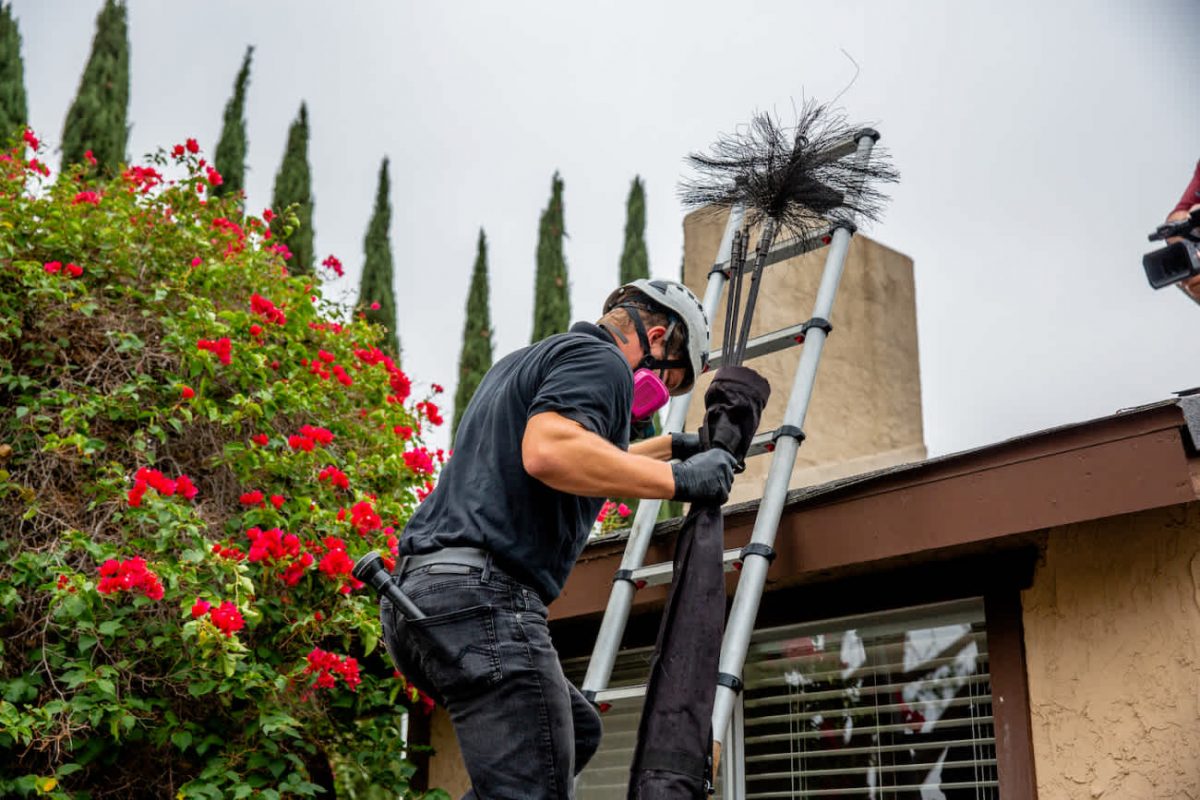
By 2030 the entire baby boomer generation will be above the age of 65 and for the first time in history, more than 20% of the population will be at retirement age.
Innovations in smart home technology such as internet-connected appliances, voice assistants, and wearables have made it the best time in history to grow old at home as homes become much more efficient and ultimately safer for the elderly.
Whether you are a home services professional or homeowner looking to build an infrastructure of smart house technology for an aging parent, grandparent, neighbor, friend, or yourself, the following devices can all contribute to a safer home for seniors.
Benefits of a Smart House For Seniors
Although many senior citizens today are less technologically inclined than younger generations, learning to use smart home technology will be helpful for maintaining their safety and well-being.
The benefits of smart home tech for seniors extend beyond the individuals themselves and offer benefits to family, friends, neighbors, first responders and more.

Safety
First and foremost, the most important benefit of having smart devices installed in the homes of our older family members is for safety. Slips, trips, and falls are especially common with the elderly and in fact, falls are the number one cause of injury for the elderly. According to the National Council on Aging, every 19 minutes an elderly person dies from injuries sustained in a fall.
Any smart home device that can prevent, detect, or call for help in the event of a fall makes for a safer home for seniors.
Communication
Smart home devices offer seniors the ability to manage their home from a mobile device in the comfort of their bed or seat.
For example, if a caregiver was at the front door, they could see who it is, talk with them to confirm, and unlock the door without getting up and risking injury.
Any elderly person living alone also now has a source of interaction and communication even if with a voice assistant. They can ask for the weather report, news, and even make calls to family and friends, simply using voice commands.
Peace of mind
Smart devices create a net of safety around seniors in the home and an opportunity for family, friends, and others to feel comfortable and confident leaving their elderly loved ones at home.
Considering when to move elderly family members into assisted senior living facilities can be a painful decision but when their safety is compromised, it becomes a necessity. With modern technology available to aid our aging parents and grandparents, we can rest assured their safety and well-being is being monitored.
76% of Seniors Don’t Own Any Smart Home Devices
We are conscientious of the benefits smart home technology is for seniors, but we were curious if the aging population is aware and making their homes smarter and safer.
Using Google Surveys on January 4th, 2020, we surveyed 1,000 Americans above the age of 55 about which smart home devices they own, if any.

While it is unfortunate that a large majority of seniors do not own any smart home devices, 12% own a voice-activated assistant, which is one of the more versatile smart home devices. Beyond that, seniors who have smart cameras or sensors, pill dispensers, lights, and garage door openers make up a combined 12%.
As the population ages and it becomes clear these devices make an impact on safety in the home, we are confident these numbers will increase. We’ve compiled a list of 11 smart home devices to keep the elderly safe within their homes in 2020 and beyond.
How Service Pros Can Help
As a pro in your field service industry, you can help your clients make safe (and smart) choices when considering remodels, replacements, and more.
While the smart devices are commonly more expensive than standard analog devices, it’s worth noting to clients and potential clients how each device can benefit their safety and the safety of their homes.
Below we cover 16 common smart home devices for nearly every room in the house. Whether you are an HVAC professional, plumber, garage door technician, or home cleaner, there are devices for you to suggest your clients install and consider for yourselves.
16 Smart Home Devices For Senior Citizens
Below are 16 of the best smart home devices for the elderly to have installed. While we recommend installing this technology, we do not recommend installing it yourself. We recommend hiring a service pro or handyman to help install and avoid injury.
1. Voice-Activated Assistants
Voice assistants, like Amazon’s Alexa, Google Home’s ‘Hey Google’, and Apple Homepod’s Siri, allow you to converse with natural language processing software to activate, ask and have your questions answered.
These smart home assistants can make purchases if connected to a payment-enabled account, dictate the news and weather, set timers in the kitchen, and control other smart home devices like lights, television, and more.
While there are many use-cases for the average American, there are some features of the voice assistant that are particularly beneficial for seniors:
- Set automatic reminders for daily, weekly or monthly tasks and events like doctor appointments and reminders to take medication.
- Place outbound calls in the event of an emergency.
- Receive voice-activated first-aid instructions.
2. Smart Pill Dispenser
A smart pill dispenser allows you to load your medications and program them to be dispensed and available according to the prescribed schedule. Some smart pill dispensers even have locking mechanisms that prevent theft or accidental overdoses.
Most senior citizens are prescribed a number of medications to treat common age-related ailments, and many are treated for other less-common chronic diseases. Taking the right medication at the right time can be a life or death event.
In fact, the National Institute of Health found that elderly women are most susceptible to overdose when 77% of overdoses among the elderly were women.
3. Fall detection sensors
Motion sensors can be great for security systems to detect intruders, but some companies have built sophisticated algorithms to detect human falls. Some even use AI and machine vision to differentiate between animals and humans.
These sensors are important to install in the homes of the elderly especially. As previously mentioned, slips, trips, and falls are a major concern for seniors and having these sensors connect directly to friends, family, or first responders can help save lives.
4. Smart Thermostat
Smart Thermostats allow you to maintain a temperature-controlled environment while maintaining energy efficiency. If you forgot to turn off your heat or A/C before leaving the house, you can use a mobile device to control the system remotely.
For seniors, it’s important to keep indoor temperatures mild as it is possible to experience hypothermia and heat stroke indoors. If mobility within the home is limited, smart thermostats allow you to manage the temperature without getting up and manually changing the settings.
5. Smart Locks
Integrating an internet-connected lock may have security concerns, but the ability to manipulate a lock remotely is a great leap forward in home management for the elderly.
Smart locks can have a number of authentication methods to unlock a door. Biometrics, for example, use fingerprints, retina scans, voice recognition or other techniques to verify the person is authorized to unlock the door. Smart locks can also have unique pin numbers, key cards, and of course, the use of smartphones.
Smart locks are particularly helpful for the elderly. If there is an emergency a care provider, neighbor, or first responder can be easily granted access from an authorized mobile device without having to physically damage the property to get in.
6. Security Cameras
Similar to smart locks, a security feature that also benefits the elderly is a smart camera strategically placed within the home. Perhaps the camera is next to the front door, allowing the homeowner to quickly determine who is at their door.
Multiple cameras can also be placed within the home, and view access granted to friends or family members. This allows trusted members of the elder’s inner-circle to temporarily check on their aging parent, grandparent, or friend, and verify they are safe and sound.
7. Robotic Vacuum
These devices autonomously navigate your home’s floor plan, scouring for dust or dirt to clean up for you. These vacuum cleaners are capable of moving around and underneath furniture, reaching the difficult to clean spaces.
It is estimated that the average American spends 6 hours per week cleaning their home, but for seniors, it likely takes them longer to accomplish the same cleaning tasks. Thankfully, these robotic innovations have brought a wave of automated cleaning devices to lighten the load.
8. Smart Pet Feeder
Pets have been found beneficial for healthy aging. In fact, pet owners age 50–80 reported reduced stress levels, a sense of purpose, a connection with others, and a more physically active lifestyle.
Despite the benefits of support animals, 20% of elderly people surveyed reported a lack of time to care for a pet. This is why a smart pet feeder which distributes food and water automatically is a great device for elderly pet owners.
These devices keep animals on a consistent feeding schedule with the same amount of food each meal. They can also send notifications to confirm when food and water has been distributed. This allows elderly pet owners to have a peace of mind that their pets will be well feed, even if they are not physically able to feed them or forgetful.
9. Smart Light Bulbs
We’re not talking about The Clapper you had back in the 80s.
Smart light bulbs are WiFi-enabled LED lights that allow more control and efficiency. For example, you can control every smart bulb in your house from your smartphone. You can also schedule the lights to turn on at a certain time and customize your lighting. Many smart light bulbs are also compatible with voice assistants — a step up from The Clapper.
Smart lights are a good idea for elderly homeowners because you can quickly turn lights on with your voice or smartphone when you need to get up, preventing falls and injuries caused by unseen objects in the dark.
10. Smart Outlets
Smart plugs or outlets are extensions of a normal outlet that allows you to turn devices on and off using a smartphone or voice assistant. These can be used to adjust your lights, start your coffee maker, turn off appliances, and more.
These smart plugs can be helpful for your appliances that are easily forgotten but pose potential fire hazards. If you leave the house with an oven, space heater, curling iron, or any other electronic device on and plugged into a smart outlet, you can turn the devices off remotely.
This is yet another way for seniors to use their devices to turn lights on to navigate a dark room. The ability to turn devices, lights, and more on and off from a smartphone is a great tool for senior citizens to have when staying at home or leaving on a vacation.
11. Smart Garage Door Controller
Wifi-enabled garage door openers allow you to check that your garage door is sealed whether you are at home or away. The ability to open and close your garage door from a smartphone is especially important for senior citizens.
Forgetting to close the garage door at night or when leaving on a trip can open your garage and home up to thieves, wild animals, and other unwanted guests. The ability to open and close the garage door from a mobile device can help secure your home from the comfort of your bed.
12. Smart Kitchen Appliances
From oven ranges and refrigerators to toaster ovens and microwaves, there is a smart device for that. These devices are able to integrate with smart home hubs and voice assistants like Amazon Alexa and Google Home.
The ability to wirelessly control the oven can save seniors a trip to the kitchen to preheat the oven, change the temperature, turn the oven off, and more. Smart refrigerators provide an easy way to set timers, create lists, and track expiration dates for perishable items.
13. Smart Clothes Washer and Dryer
Smart washers and dryers allow their owners to track their wash and dry cycles, monitor their energy usage, and alert when ducts start to become dangerously clogged. Poorly maintained clothes dryers are responsible for nearly 15,000 home fires every year.
Seniors are able to manage their laundry loads and most importantly, be reminded when its time for lint cleaning and routine dryer maintenance.
14. Smart Air Filter Monitor
These air filter attachments can alert you when your heating and cooling systems are at risk of clogging, which produces poor air quality in the home, higher energy bills, and is the leading cause of heating and cooling system failure.
Many senior citizens are likely unaware when their heating and cooling systems are clogged and impacting their air quality. A smart air filter monitor can send alerts via SMS and email when the filters are becoming full and need replacing.
HVAC service pros benefit from this device given their consumers will be more in tune with their system’s maintenance needs.
15. Smart Leak Detector
A burst pipe or leaky pipe can be a major problem for homeowners, especially seniors. Not only can they cause damage to the property, but they drive up the water bill and pose a potential risk of injury.
Smart leak detectors is placed in the pipe system to detect changes in water pressure, usage, and more. These can indicate a running toilet, water heater, outdoor hose, faucet, and more. Alerts are sent to the homeowner’s phone nearly instantly using the WiFi-enabled device.
Plumbers benefit the most from these tools because diagnostics are helpful for finding the easy-to-miss leaks.
16. Smart Water Heater
While it’s recommended to have a smart leak detector installed, some smart water heaters can take some of the guesswork out of this with leak detection built-in. Smart water heaters also allow homeowners to manage their water temperatures remotely and monitor energy usage.
Seniors benefit from their easy to maintain and savings on costly repairs from their advanced leak detection. We recommend having pros handle the smart water heater installation, especially for seniors.
Keeping Seniors Safe
Smart home devices can feel like a “nice-to-have” more than an essential safety device, but these tools are readily available to aid the aging homeowner.
As home service providers, it’s up to us to go the extra mile and add value for our customers. When they invite us into their home, we aim to leave it a better place. For seniors who need to install safety devices but can’t afford to out of their social security budget, for example, you can now offer them financing options.







